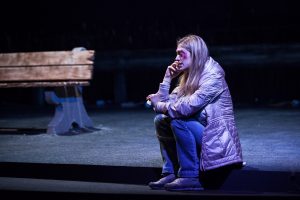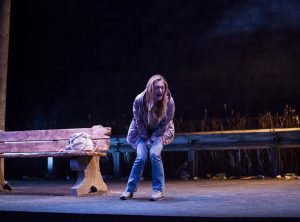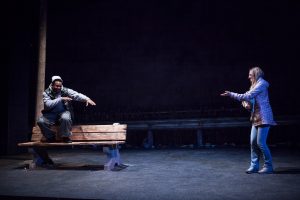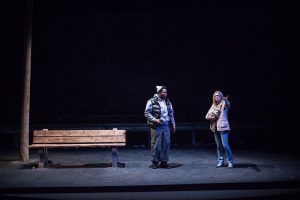THE JOY OF SURVIVAL
Marin Ireland is mesmerizing and deeply moving in Ironbound. She plays Daria, a Polish immigrant. To my ear, her accent is impeccable ’” and most importantly, entirely consistent. We believe she is searching for the best English words to express herself, and often her syntax has an authenticity of its own. “You have broke me to one hundred pieces,” she tells her cheating American boyfriend, right after acknowledging he is hardly the love of her life. “I weigh you on scale and I say, ’˜Okay,’” she tells him, shrugging, pretending to be nonchalant as she dares him to challenge the truth of her logic.
We switch back and forth between time periods, always at a bus stop in the Ironbound section of Elizabeth, New Jersey ’” an industrial area under a mass of parkway overpasses. In her 20s, she works at a factory across the road. By her early 40s, the factory has long since been shuttered, and she gets by cleaning houses, sharing expenses with Tommy (Christian Camargo), a mailman who tries to downplay his serial philandering as a mistake. “I’m no good alone, you know that,” he says, sometimes demanding she stay, other times begging.
She knows much more about his affairs than he imagines, and can detail times, places, and the frequency of the trysts. He’s even sleeping with one of the rich women she works for. They argue about the screwing around, but their differences turn especially urgent over her need to find her adult son and get him into rehab. Yet, to me at least, Tommy emerges as a source of hope and joy ’” and not just because he makes a decent living. Her past is littered with heartbreak, abuse, the drug-addicted son, and the grinding poverty of the working underclass. Whatever his faults, Tommy represents stability ’” a quality sorely lacking in her life. Until Tommy, she is rooted only by two things: Her son, and the seemingly magnetic draw of the factory. Both fail her. Would Tommy cheat again, despite his promises? Undoubtedly. But could she count on him? Almost certainly.
Playwright Martyna Majok knows the world well ’” her immigrant mom is still a cleaner. But her understanding of Daria is deeper than nationality or economic class. Majok does what the best playwrights do. She creates a very specific place, time, and cultural landscape, then makes us feel it as a universal representation of all our fears, loves, joys, and furies. Even as Daria makes terrible choices, we understand why, and if we’re honest, admit we might just do the same. Soap operas can focus on how sad it is to “settle” for anything other than a soulmate and material success. In life, though, each of us lives the consequences of our choices. What might be seen as settling to some, could feel like a door opening to emotional and physical freedom for someone else.
As Tommy, Christian Camargo is inventive and spry. His energetic Jersey rhythms and twitchiness belie the delicacy and dimensionality of his work. For all his cluelessness, Tommy reveals that he understands and appreciates Daria in surprisingly tender ways. Camargo gets the mix of bombast and sensitivity just right, never straying into stereotype, and never wearing out his welcome.
We also meet two men from other times in Daria’s life ’” her first love Maks (Josiah Bania) and a kind stranger Vic (Marcel Spears). Maks came over from Poland with her and is the father of her child. His small ambitions to find a better life in Chicago seem too dangerous to Daria, who stays behind, believing she is safe at the factory. Bania is appealing and sweetly funny.
Vic shows up for one scene, in a particularly low moment for Daria. Everything about the character is a surprise, especially his intuitive kindness. Spears has a wonderful physicality (all the actors do) and I love that as the character reveals himself, and unexpected details about him emerge, Spears seems to delight in how little he fits any preconceived notion of how someone engaged in similar activities might look. And when he smiles, he lights up everything around him.
Director Tyne Rafaeli does a superb job of creating kinetic momentum, giving dynamism to what is essentially a series of two-hander scenes. Each scene is two people talking, yet the action feels large and the characters own the space. I have a hunch that Rafaeli appreciates and enjoys what actors bring to the party, and that in the rehearsal process, there was a spirit of joy and exploration. Maybe I’m just projecting, looking for a way to explain my own emotional response ’” for in the end, I left the theater with a profound sense of joy. Is that weird?
photos by Chris Whitaker
Ironbound
Gil Cates Theater at the Geffen Playhouse
10866 Le Conte Avenue in Westwood
Tues-Fri at 8; Sat at 3 & 8; Sun at 2 & 7
ends on March 4, 2018
for tickets, call 310.208.5454 or visit Geffen Playhouse









